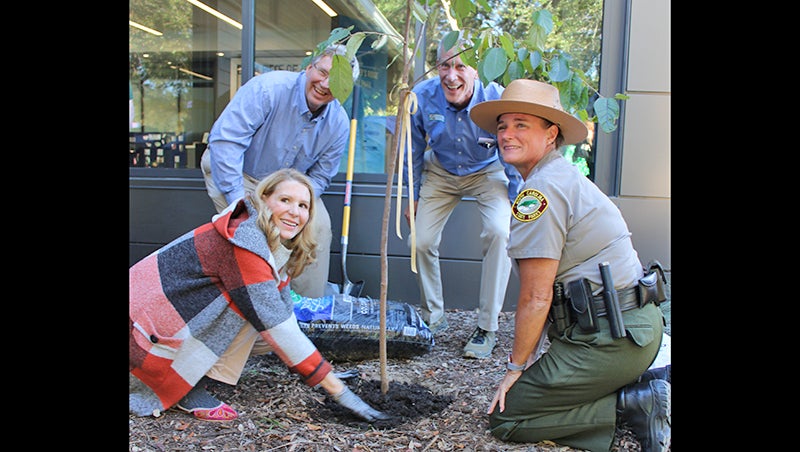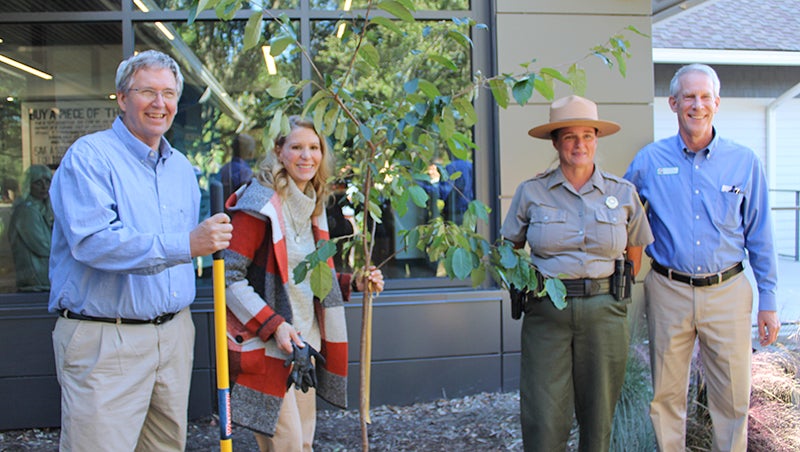First Lady Kristin Cooper plants persimmon tree at Jockey’s Ridge State Park
Published 1:34 pm Monday, October 23, 2023
|
Getting your Trinity Audio player ready...
|
In honor of Native Plants Week, First Lady Kristin Cooper planted a persimmon tree at Jockey’s Ridge State Park in Nags Head on Wednesday, October 18, 2023.
Cooper was joined by members of Audubon, NC Department of Cultural and Natural Resources (DCNR) Secretary Reid Wilson and Jockey’s Ridge Superintendent Joy Greenwood.
The planting was in celebration of a new DCNR policy, which requires that trees, shrubs and other vegetation native to the southeastern United States be used at state parks, historic sites and other DCNR properties. Locally, this includes not only Jockey’s Ridge, but Jennette’s Pier, the North Carolina Aquarium on Roanoke Island, Roanoke Island Festival Park, the Outer Banks History Center and the Graveyard of the Atlantic Museum. Additionally, local governments that are awarded grants from DCNR for specific projects will also be required to use native plants for those projects.
“This is government trying to lead by example,” said Wilson in a short speech before the planting. “By doing this we’re trying to encourage businesses, homeowners, homeowners’ associations, and other government agencies to embrace native plants as well.”
There are no shortage of plants to choose from – North Carolina has over 3,900 native plant species, making it one of the most diverse locations in the south. Native plants naturally thrive, requiring less fertilizer and less watering.
Native plants feed native birds and other wildlife through their seeds, berries and nectar, and through the insects that draw near. Most birds depend on insects to feel their hatchlings. More native plants means more insects, which means more birds growing to adulthood.
A typical chickadee nest, for example, needs about 6000 soft bodied insects to get her chicks from hatchling to fledgling, according to Curtis Smalling, Audubon’s interim executive director. “In a landscape dominated by non-native plants there just aren’t a lot of insects … so having native plants really allows birds to be more productive makes them more resilient,” he said.
Wilson then introduced First Lady Cooper as “someone who’s been a native plant advocate way before it became cool,” drawing chuckles from the audience and Cooper herself.
Cooper has been a longtime supporter of the native plants, and has partnered with Audubon North Carolina to plant a bird and pollinator-friendly garden at the Governor’s Mansion in Raleigh.
When they approached to see if she would be interested in planting a native plants garden, Cooper first said she didn’t think there was any space. “But then I saw this giant Japanese privet hedge wrapping around and I’m like, ‘You know, I think I just found a place.’”
Cooper was pleased to report to the small crowd that in a recent bird count, a 25% increase in the variety of birds in her yard was discovered after just two years with the native plants garden.
At the conclusion of the brief remarks, Cooper, Wilson, Smalling and Greenwood planted the persimmon tree outside of Visitor’s Center in the native plant garden, which is maintained by the Outer Banks Woman’s Club. The tree came from Manns Harbor nursery Nature’s Harmony.
The Roanoke Island Woman’s Club has provided benches from recycled materials, and the Friends of Jockey’s Ridge provided refreshments for the event.
For those interested in planting their own native trees and shrubs, Audubon.org has a native plants database lookup by zip code. A quick search reveals 75 “best” and 336 total results for native plant options for the Outer Banks, as well as places to buy them. Users can filter results according to types of plants and the types of birds they attract.
SUBSCRIBE TO THE COASTLAND TIMES TODAY!








